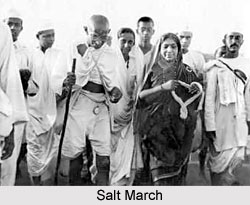 In the beginning Mahatma Gandhi`s choice of salt tax was met with incredulity by the Working Committee of the Indian National Congress, Jawaharlal Nehru and Motilal Nehru were ambivalent; Sardar Vallabhbhai Patel suggested a land revenue boycott instead
In the beginning Mahatma Gandhi`s choice of salt tax was met with incredulity by the Working Committee of the Indian National Congress, Jawaharlal Nehru and Motilal Nehru were ambivalent; Sardar Vallabhbhai Patel suggested a land revenue boycott instead
British establishment too, was completely unmoved by the hike in salt tax as they were absolutely sure that there would be no resistance for the salt tax. The Viceroy himself, Lord Irwin, did not take the threat of a salt protest seriously, writing to London, "At present the prospect of a salt campaign does not keep me awake at night."
Mahatma Gandhi, however, had clear reasons for the decision. The tax of salt was deeply symbolic choice as the salt was used by all in India to replace the salt lost by sweating in India`s tropical climate. An item of daily use could actually resonate more with the various classes of citizens than an abstract demand for greater political rights.
The Salt tax formed 8.2 % of the revenue of British Raj and hurt the poorest Indian very badly. In wake of explaining his choice Gandhi said, "Next to air and water, salt is perhaps the greatest necessity of life." Contrary to the other leaders, the well-known Congress statesman and future Governor-General of India, Chakravarti Rajagopalachari, understood Gandhi`s viewpoint. In a public meeting at Tuticorin, he said:
Gandhi felt that this protest would dramatize the demand for Purna Swaraj in a way that was meaningful to the lowliest Indians. He also reasoned that it would build unity between Hindus and Muslims by fighting an error that touched them equally.
After the protest gathered steam, the leaders realized the power of salt as a symbol. Nehru remarked about the unprecedented popular response, "It seemed as though a spring had been suddenly released".






































